Get to know the team!
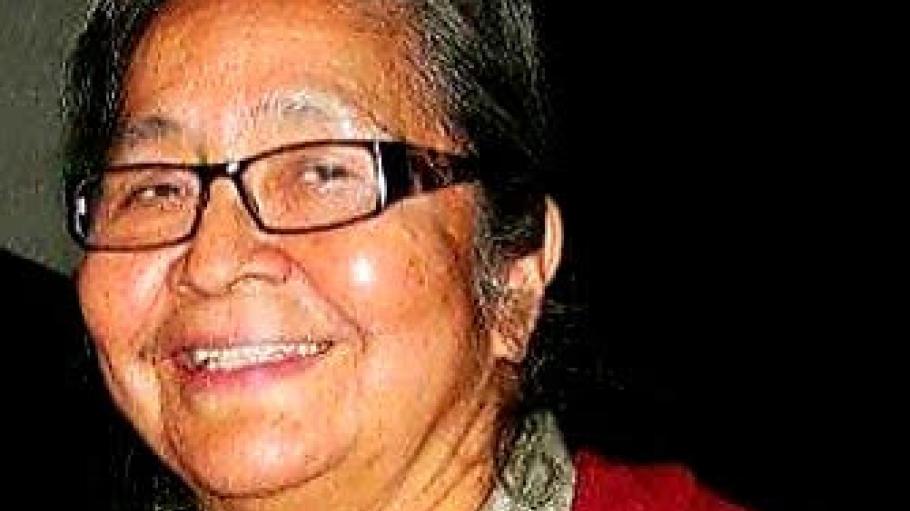
Pauline Shirt, Guiding Elder
Grandmother Pauline Shirt was born and raised with her seven sisters and one brother in Alberta, Canada on the Saddle Lake Reserve, where her family raised horses and farmed the land. She is a first speaker in her indigenous language of Plains Cree.
In the late sixties, she moved her family to Toronto, where she and her then husband, the late Vern Harper raised their five children. She has been part of an Indigenous Medicine Society since the early 1980s, where she holds a degree in sacred Indigenous Knowledge, equivalent to a Ph.D. in western-based education systems.
Pauline is a wisdom keeper and pioneer in indigenous education, holistic health and judicial system changes in Canada. This continues to make her well sought after for her traditional teachings, lectures, and wise counsel.
Most notable highlights:
- The Name Unspoken: Kapapamahchakwew 2019 (Co-author Sharon Berg) – Winner of 2020 IPPY Award Best Nonfiction Book Regional Canada East Bronze Medal
- Elder advisory council – Attorney General of Ontario (2015 – present)
- Co-founder of the first urban native way school in Canada – Wandering Spirit Survival School 1974 (Wandering Spirit School-Kapapamahchakwew, Toronto – Present)
- President of Indian Rights for Indian Women of Canada – repelling Indian Act Bill c31 and the White Paper. (1970-80s)
- Co-organizer of the southern Ontario leg of the Native People's Caravan to Ottawa 1974 – Cross Canada mobilization and demonstration in support of land and water rights of native people in Canada.
- Founder of the first independent indigenous holistic practitioner’s clinic 1984 – Red Willow, Toronto.
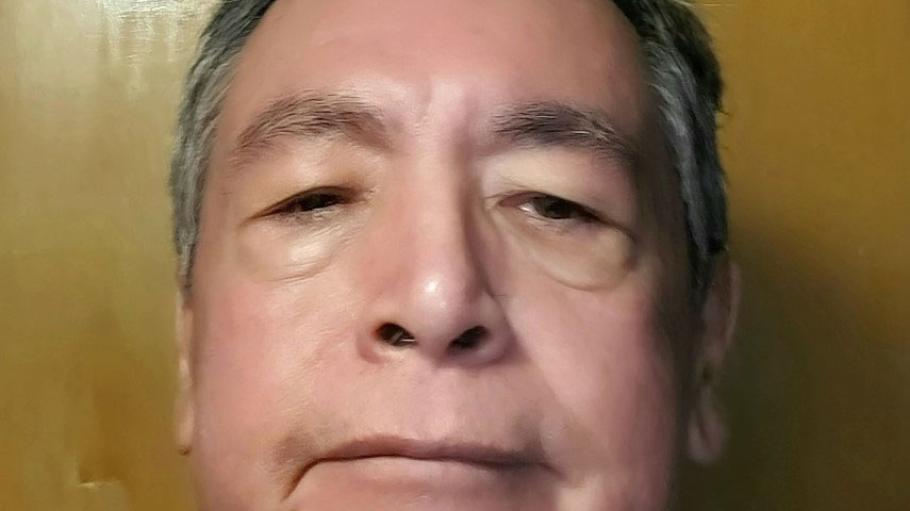
Don Ense, Resident Elder
Don Ense was employed as a mental health worker at Native Child and Family Services from 2005 to 2021. He held the position of Elder-in-residence and Knowledge Keeper for two years from 2019 to 2021. Don brought a wealth of traditional knowledge, ceremonies, and teachings which he learned from his grandparents, Elders, and healers, and shared these teachings and ceremonies with the urban Native community. Don began learning about traditional medicines from his grandparents, Joseph and Louise Ense, growing up at M’Chigeeng First Nation on Manitoulin Island in the 1960s. Don started learning traditional knowledge in earnest when he began his Native art career in 1975 from many Elders from different tribal nations in Canada and the United States. One of his teachers was the late healer, Adam Lussier, from White Earth Reservation in Minnesota, who worked at Anishnawbe Health Toronto Centre for many years.
Don was trained by Adam Lussier’s Oshkawbewis, (helper) Patrick McCoy, to build and conduct sweat lodges and to gather traditional medicines in 2000-2002. Don brought a combination of both traditional and Western healing methodologies and modalities into his practice of social work. He developed medicine wheel modalities to address various mental health issues to facilitate intergenerational trauma healing. Native Child and Family Services mental health department still utilizes the use of his modalities to address various mental health issues with their clients. He graduated from Lake Superior State University at Sault Ste. Marie, MI, in Human Services and Sociology (majors) and Social Work and Native American Studies (minors) in 2005.
Also, Don is known for painting Anishinaabe legends and childhood memories of life on the reserve. His art and biography were published, along with other Native artists from Manitoulin Island, in an art book entitled, The Sound of the Drum: The Sacred Art of the Anishnabec, by Mary Southcott in 1984. Other publications followed and included encyclopedias, school textbooks, art calendars, greeting cards, art prints, art magazines, Native periodicals, exhibition catalogues, and media interviews. His work and interviews have been documented on APTN, TV Ontario, and Fireside Chats with Connected North. His artwork is displayed in many prestigious art galleries and museums in Canada, the United States, and Europe and is recognized nationally and internationally in the art world. He, along with six other Ojibwe artists from Manitoulin Island are the early members of the Manitoulin Woodland Art and is regarded as the Second Wave of Native artists in the Renaissance of Native Art in Canada.
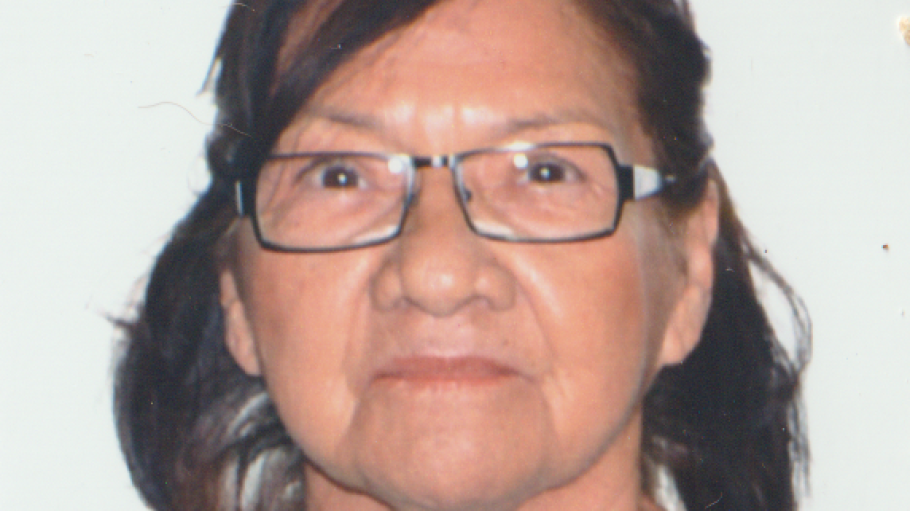
Julie Debassige, Visiting Elder
Aanii. Boozhoo Julie Debassige nindishnikass. Hello, greetings from Creation. My name is Julie Debassige. I am Anishinaabe Kwe (woman) from M’Chigeeng First Nation.
I dedicated myself to serving my community and the larger Indigenous community here in Toronto since 1994. For the past 13 years as Traditional Counsellor/ Healer, I have practiced a holistic approach to healing, and I am endowed with cultural knowledge of Indigenous people and our traditions. I also lend my expertise to larger intuitions that are embracing a reconciliation framework through their Advisory Circles and/or committees.
My education plan is to become a registered counsellor/therapist so that I may continue to make a difference in Indigenous lives, especially in my home community. I have a commitment towards building capacity for Indigenous mental health practitioners to acquire professional training and certifications to serve their own communities. In addition, I am a proponent of lifelong learning who is currently in a Master of Counselling Psychology program.
I have a large family and look forward to supporting the George Brown community and supporting the needs of the students.
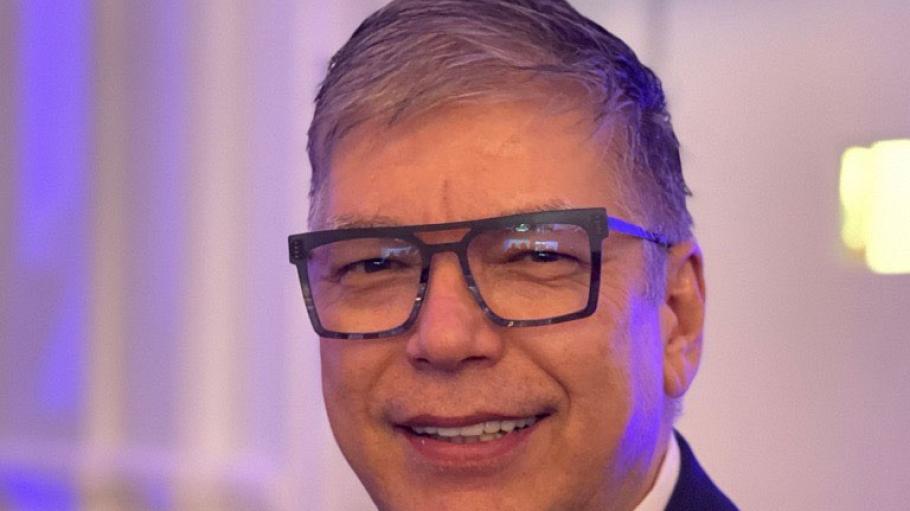
David Wolfman, Director
David Wolfman, widely known as "The Wolfman," has made an indelible mark on Indigenous culinary education for over four decades. With an illustrious career, he's not only famed for his 18-year television show, "Cooking with the Wolfman," but also acclaimed as a Chef Professor and an alumnus of Culinary Arts at George Brown College, spanning an impressive 29 years. His extensive contributions extend to culinary consulting for First Nations, Metis, and Inuit communities nationwide, acting as a prominent media personality, Toronto's inaugural Indigenous caterer, and a celebrated co-author of award-winning cookbooks. Hailing from the Xaxli'p First Nation in British Columbia, David Wolfman is a classically trained chef and a Culinary Arts Professor at Toronto's George Brown College of Applied Arts and Technology.
Dedicated to enhancing the quality of life for Indigenous Peoples, David Wolfman serves as the Acting Director of Indigenous Initiatives at George Brown College. His mission is centered on advancing reconciliation by expanding Indigenous Peoples' access to higher education and fostering learning opportunities that underscore the significance of understanding Indigenous history and culture in the pursuit of social justice.
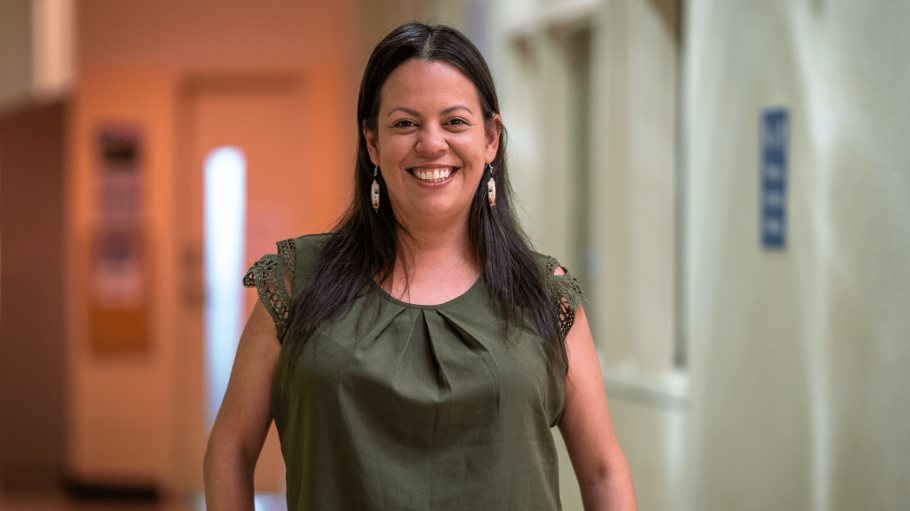
Jolene May, Indigenous Mentorship Program Lead
Jolene May (she/her) is Anishinaabe from Whitefish River Birch Island and a former graduate of George Brown College's Community Worker Program. She is highly motivated in Indigenous student success initiatives and was the first-ever elected Indigenous student representative to have a seat on the Student Association Board of George Brown College. Jolene is passionate about helping Indigenous students be successful in their education journey and is excited to help students by assisting them in their needs while attending George Brown College. Jolene is skilled at navigating application processes of bursaries and scholarships and has successfully created and implemented student support programs to help students navigate their learning successfully.
Jolene works closely with Indigenous Knowledge and Wisdom keepers to inform her practices based on cultural teachings and perspectives. She approaches her work with a holistic lens and seeks opportunities to build relationships with students and community, both internally and externally. Jolene is directly involved in George Brown College’s Annual Pow wow and additionally, supports the rollout of cultural events and workshops to help to create a home for Indigenous students studying at George Brown. She Is committed to the success of Indigenous students in her work, and she is willing and eager to help students in any way she can.
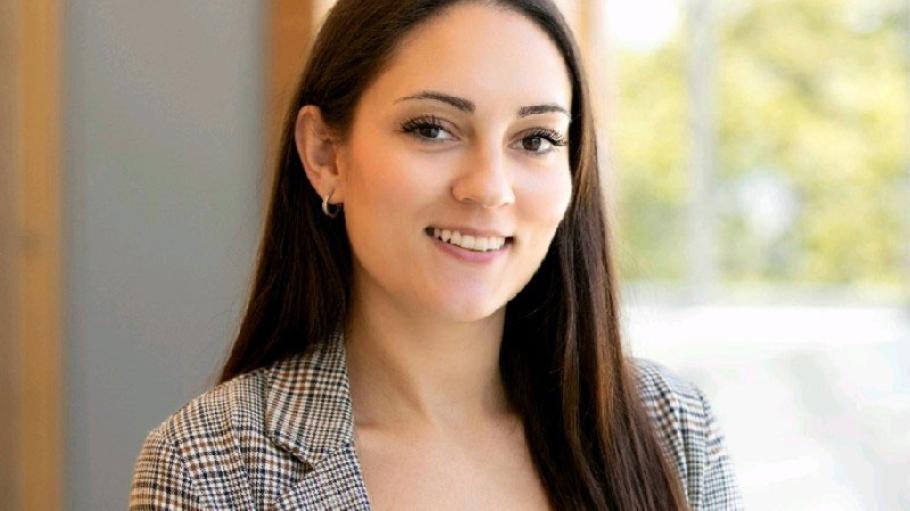
Victoria Francavilla, Operations Coordinator
Victoria Francavilla (she/her) is a Toronto urbanite through and through. Growing up on Treaty 13 territory, which are traditional lands of the Mississauga's of the Credit First Nation, Haudenosaunee, and Anishinaabe Peoples, Victoria has been immersed in the rich history and beauty Toronto has to offer for her whole life. As the Operations Coordinator, Victoria works centrally to bring the visions and goals of the Indigenous Education Strategy to life.
Victoria is a York University Alumna, completing her Double Major Bachelor of Arts (Honours) degree in Psychology & Health and Society. As well, she has completed a Master of Arts degree in Health Policy and Equity, with her research centering on Indigenous youth mental health. Victoria's professional background includes a breadth of organizational and administrative expertise, which she couples with her knowledge and understanding of Indigenous wellness and the post-secondary student experience, to add to the great work being done by the Indigenous Initiatives team.
As a critical thinker and empath at heart, Victoria contributes to an energized, organized, and growth-focused environment that aims to improve experiences and outcomes for Indigenous students at George Brown College.
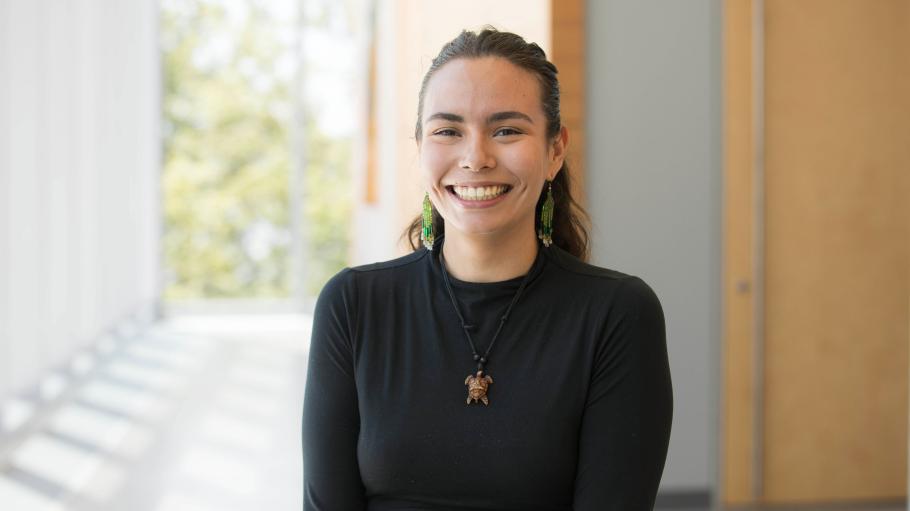
Cassandra Carlson, Indigenous Student Support Specialist
Cassandra Carlson (she/her) is Anishinaabe Kwe from Wauzhushk Onigum Nation, where she grew up in Sault Ste Marie, ON. Cassandra is a recent graduate from Brock University, where she received her Bachelor of Science in Biology and Psychology. Throughout her studies, she was involved in multiple research projects focusing on Indigenous people's social psychology and biology. Her experience in western education has brought forward further perspectives on how these institutions can grow to better accommodate and reconcile with Indigenous learners and their communities.
Cassandra has worked with a variety of organizations including the Jane Goodall Institute of Canada, Plenty Canada, Pearson Education and Young Diplomats of Canada. Cassandra has advocated for Indigenization in policies and science at the UNPFII (United Nations Permanent Forum on Indigenous Issues) in 2022 and COP-15 (United Nations Biodiversity Conference). Cassandra is passionate about Indigenous medicinal plants and preserving biodiversity, as well as forwarding plans for reconciliation and decolonization.
As Indigenous Student Support Specialist, Cassandra is excited to provide the necessary resources and tools to help Indigenous students thrive and succeed at George Brown College. As apart of this role, Cassandra works to support First Nations, Metis, and Inuit learners through their post-secondary experience in addition to providing cultural programming and building relationships with the greater community.
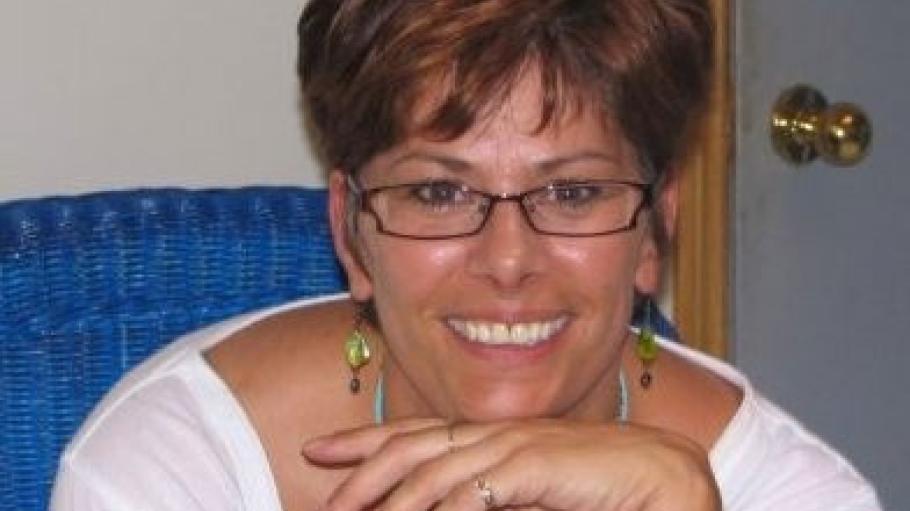
Laraine Hale, M.S.W., Indigenous Counsellor
Laraine is a woman of mixed ancestry (English, Irish, and Haudenosaunee), a mother, daughter, sister, auntie and friend. She possesses both undergraduate and graduate degrees in Social Work. Her professional pursuits span over 30 years and encompass the roles of clinician, researcher, educator and consultant. These experiences inform and inspire her investment in the lives of individuals, families, groups and First Nation, Metis, and Inuit communities where she continues to listen, share and learn. She is invested in advancing Reconciliation efforts personally and professionally and remains a passionate advocate for fostering antioppressive spaces and interfaces.
